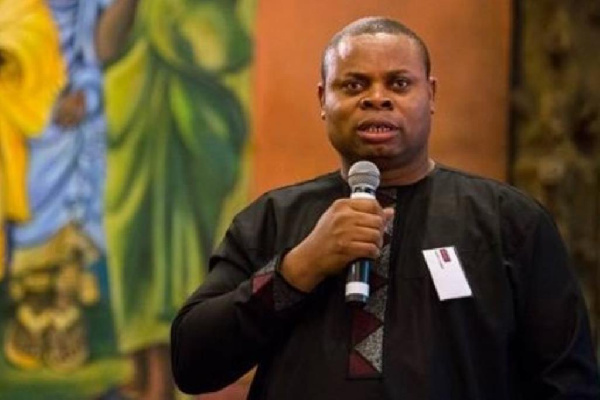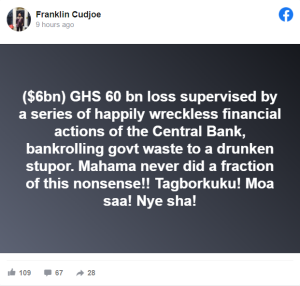The President and Founder of IMANI Africa, Franklin Cudjoe has said that former President John Dramani Mahama during his tenure as president never recorded even half of the GH¢60 billion loss incurred by the Bank of Ghana.
The founder of IMANI Africa blamed the huge losses by the Central Bank on reckless financial actions to support the government.
In a Facebook post on Wednesday, August 9, 2023, Franklin Cudjoe lambasted the government for the huge losses incurred by the Bank of Ghana.
“($6bn) GH¢60 billion loss supervised by a series of happily reckless financial actions by the Central, bankrolling government waste to a drunken stupor. Mahama never did a fraction of this nonsense!! Tagborkuku! Moa saa! Nye sha!” he wrote on his Facebook page.
His comment comes on the back of calls by the Minority in parliament for the Governor of the Bank of Ghana, Dr Ernest Addison to resign over the gargantuan losses.
Background
The Bank of Ghana incurred a significant loss in 2022 largely as a result of the DDEP, its 2022 Annual Report, and Financial Statement have said.
According to the report, the central bank’s holdings of government debt were restructured whereas non-marketable holdings of Government of Ghana instruments including long-term stocks, a Covid-19 Bond, and overdrafts were subjected to a 50 percent haircut.
Bank of Ghana’s other claims (holdings of marketable instruments) were exchanged under similar terms as other financial institutions under the DDEP.
This led to an impairment of GH¢48.40 billion in 2022.
At the same time, the Central Bank incurred revaluation losses on its foreign assets and liabilities due to exchange rate depreciation. The impairments and revaluation losses led to a negative equity position of GH¢55.12 billion for 2022.
The report also stated that despite a healthy trade surplus, the balance of payments recorded a deficit of US$3.64 billion on account of significant net outflows in the capital and financial account.
This led to a drawdown of US$3.46 billion in Gross International Reserves from US$9.70 billion at end-December 2021 to US$6.24 billion at end-December 2022, providing 2.7 months of import cover.
The significant drawdown in reserves triggered immense currency pressures and the reduction in the Common Equity Tier 1 capital ratio to 5.5 percent, from 6.5 percent, and an increase in the maximum Tier 2 capital ratio to 3.0 percent, from 2.0 percent of total risk-weighted assets.
View the post below:
Source: ghanaweb.com





